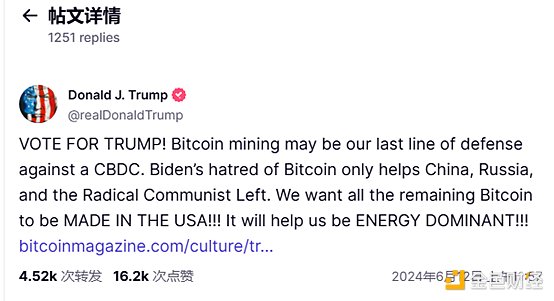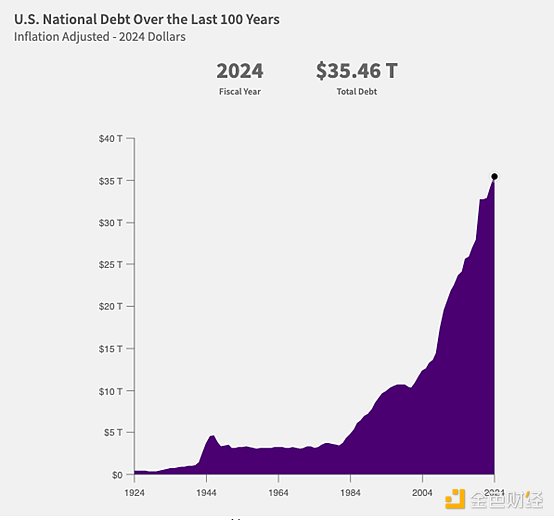Source: Cointelegraph, compiled by Jason. Golden Finance
Whether it is sincere or not, Trump has begun to get involved in the field of cryptocurrency, trying to attract cryptocurrency voters.
This year, Trump's Republican Party released a draft political plan, which specifically mentioned cryptocurrency in the innovation plan section, second only to artificial intelligence and space expansion development plans, which summarized Trump's main cryptocurrency goals as follows:
"The Republican Party will end the Democratic Party's illegal and un-American cryptocurrency crackdown, defend the right to mine Bitcoin, and ensure that every American has the right to keep their own digital assets while trading without government surveillance and control."
Not only that, Trump made a shocking statement at the Nashville 2024 Bitcoin Conference, saying: "I assure the Bitcoin community that Biden and Harris' anti-cryptocurrency campaign will end on the day I am sworn in."
But the question is, can Trump really do what he says? Let's first take a look at what bold "Bitcoin promises" he has made -
Promise 1: All remaining Bitcoins must be "MADE IN THE USA"
The supply of Bitcoin is capped at 21 million, and 90% of it has been mined.
On June 12, Trump posted on his social media platform Truth Social that he wanted "all remaining Bitcoins to be produced in the United States," claiming that this move would help the United States become an "energy leader."

Trump's goal is to strengthen the U.S. Bitcoin mining industry and keep Bitcoin produced domestically, but this goal may face considerable difficulties due to the decentralized nature of Bitcoin mining. Ben Gagnon, CEO of cryptocurrency mining company Bitfarms, explained:
"It is absolutely possible and desirable to make the United States the number one country for Bitcoin mining. If Trump reduces red tape and increases support and investment in energy and power infrastructure, the United States will consolidate its position as the most competitive place in the world for Bitcoin mining. But the problem is that due to the decentralized infrastructure of Bitcoin, one country cannot mine all Bitcoins. It is impossible and undesirable to mine all the remaining Bitcoins in the United States or another country. Moreover, concentrating mining operations in a certain jurisdiction fundamentally violates the core principles and basic values of Bitcoin founder Satoshi Nakamoto, namely: decentralization.
Promise 2: Use Bitcoin to solve the US $35 trillion national debt
Trump said at an NFT event associated with him: "Cryptocurrency has a bright future. I think it is true. Maybe we can use cryptocurrency to repay the $35 trillion national debt. ”
The U.S. national debt refers to the total amount of outstanding borrowings accumulated by the U.S. federal government in its history. According to relevant financial data, over the past 100 years, the U.S. federal debt has increased from $394 billion in 1924 to more than $35 trillion in 2024.

The increasing U.S. public debt will bring imminent risks and may even lead to serious long-term economic problems.
Ric, founder of Digital Assets Council of Financial Professionals, a digital asset advisory platform Edelam believes that cryptocurrency can help solve the United States' long-standing national debt problem, and Bitcoin reserves can also significantly reduce or even eliminate the United States' national debt, but the problem is that Trump may not be able to successfully establish a reserve fund, or even if he succeeds, his successor will cancel it. Trump's "using cryptocurrency to solve the U.S. national debt problem" should be an interesting statement during his campaign, nothing more.
Promise 3: The United States will establish a strategic national Bitcoin reserve
In addition to making the United States a global leader in Bitcoin mining, Trump also plans to create a strategic Bitcoin reserve and promises that if he is elected president, he will appoint a Bitcoin and Cryptocurrency Presidential Advisory Committee to design transparent regulatory guidance for this market.
However, many of the Bitcoins held by the U.S. government come from assets seized by law enforcement in criminal cases, which may pose a challenge to Trump's plan, including the seizure of BTC from the Bitfinex hacker attack, which essentially belongs to the victims, so Trump may face potential legal pressure if he advances the establishment of a strategic national Bitcoin reserve.
Fortunately, U.S. Senator Cynthia Lummis has proposed a bill to establish a strategic reserve of Bitcoin, which, if approved, would create a Bitcoin fund to hedge the U.S. national debt, with the goal of acquiring 1 million BTC within five years and holding it for at least 20 years. With the support of the U.S. Congress, Trump's plan to create a Bitcoin reserve may actually have a chance to be realized, but it still requires some of his fellow U.S. lawmakers to recognize the potential of Bitcoin.
Promise 4: Fire current SEC Chairman Gary Gensler on his first day in office
Many industry insiders have criticized the SEC for its "enforcement-style regulation" of the cryptocurrency industry. Indeed, under Gary Gensler's leadership, the SEC has filed lawsuits against several large cryptocurrency companies for allegedly selling unregistered securities.
The U.S. crypto industry has been pushing for regulatory clarity, claiming that current SEC guidance remains vague. According to industry observers, the lack of clear rules has created uncertainty and hindered market participation and growth in the U.S. crypto industry.
One of Trump's most explicit promises is that he will fire the current SEC Chairman Gary Gensler on his first day in office. He believes that the new leadership will bring a more favorable regulatory environment for cryptocurrencies and help the development of the US cryptocurrency industry. However, can Trump really fire Gary Gensler quickly?
Frankly speaking, firing Gary Gensler may not be as easy as Trump imagines. Although he does not need Senate approval to fire Gary Gensler, such a hasty removal of an influential regulator may set a dangerous precedent, which means that Trump has to find "proper reasons" to fire the chairman of the SEC, such as dereliction of duty, inefficiency or other forms of malfeasance. In addition, the entire process of determining the reasons for dismissal, legal review and administrative transition may take more than a year.
So, in the end, Trump is likely to have to stay with Gary Gensler for a while until a successor takes over.
Promise 5: The United States will stop developing CBDC
Trump has promised to stop the U.S. Treasury from developing a central bank digital currency (CBDC), indicating his opposition to the U.S. government's tightening control over digital assets. At the Bitcoin Conference in Nashville, Trump claimed: "There will never be a CBDC during my presidency. The technology poses an imminent threat to financial privacy."
Trump is not the only one who opposes CBDC. Many U.S. Republican politicians have publicly stated their opposition to CBDC, such as:
Florida Governor Ron DeSantis has signed a bill to restrict the use of CBDC in the state;
U.S. Congressman Tom Emmer has proposed the CBDC Anti-Surveillance State Act, which prohibits the Federal Reserve from issuing CBDC without congressional approval. The bill is still under review.
Promise 6: Release Ross Ulbricht, founder of Silk Road
Trump promised to reduce Ross Ulbricht's sentence on "Day 1". It is undeniable that Ross Ulbricht's sentence is very controversial and too harsh - a double life sentence plus 40 years without parole for a non-violent crime. Critics believe that compared with the sentences for similar crimes, Ross Ulbricht's sentence may be a problem of US judicial overreach.
Trump said: "We will bring him (Ross Ulbricht) home. He has served 11 years in prison."
Trump can quickly fulfill this promise because the US president has the power to reduce sentences or reduce convictions for federal crimes. Although a sentence reduction does not exonerate Ross Ulbricht, it can allow him to be released early.
Promise 7: Create a Crypto Advisory Committee to Develop Precise Crypto Policy
Cryptocurrency is a broad and complex topic, especially for regulators. Trump said that if re-elected, he would set up a presidential advisory committee to ensure that a solid regulatory framework for cryptocurrencies becomes law.
Trump said: "We will make regulations, but from now on, the rules will be made by people who love the crypto industry, not those who hate it. The task of the Cryptocurrency Committee is to design transparent regulatory guidelines for the benefit of the entire industry, and they will complete this work within 100 days."
Anonymous crypto market analyst and trader Crypto Rand pointed out that this promise by Trump may be one of the most important promises, because he believes that Congress and the U.S. Securities and Exchange Commission have repeatedly demonstrated a lack of understanding of the crypto industry and its development.
Promise 8: Crypto Self-custody as a Right
Trump promised that crypto would give cryptocurrency users the right to self-custody, which is actually codifying "not your keys, not your coins" into U.S. federal law.
Republican Senator Ted Budd proposed legislation to support Trump's commitment to the right to self-custody of cryptocurrencies. On November 7, 2023, he introduced the "Keep Your Coins Act" bill in the U.S. Senate, which aims to prohibit restrictions on Americans from trading through self-custody crypto wallets.
Summary
The results of the next U.S. presidential election will be announced this week. If Trump is really elected as scheduled, it is worth paying attention to whether these promises can be fulfilled. But there is one thing that needs to be reminded to the crypto community. During Trump's political career, he has broken his promises many times.
 Catherine
Catherine







